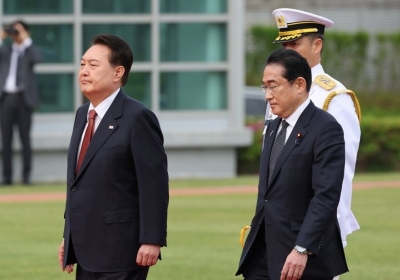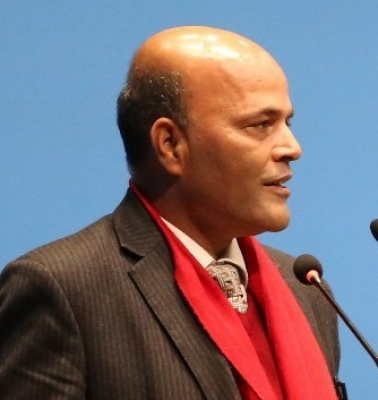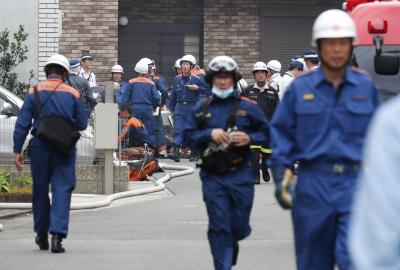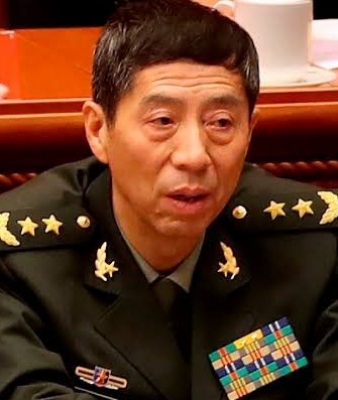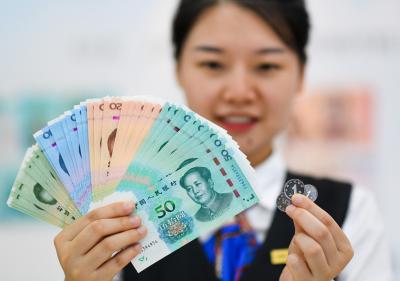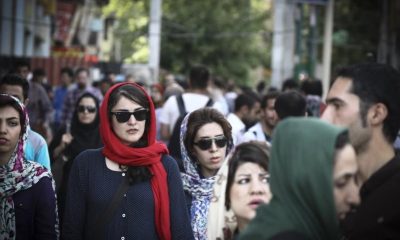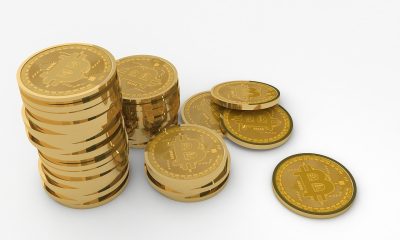Seoul: South Korean President Yoon Suk Yeol met with Japanese Prime Minister Fumio Kishida in Seoul on Sunday for the second summit in less than two months, a highly symbolic meeting demonstrating the neighbouring nations are firmly on course to the full restoration of long-frayed relations.
Yoon welcomed Kishida to the presidential office in Seoul in an official arrival ceremony that included the playing of the two countries’ national anthems and a joint honour guard review, Yonhap news agency reported.
The Japanese Prime Minister arrived in Seoul earlier on Sunday for a two-day working visit and stopped at Seoul National Cemetery to pay his respects to Korea’s fallen independence activists and war veterans before heading to the presidential office.
Kishida’s visit comes as bilateral relations have warmed significantly following Seoul’s decision in March to compensate Korean victims of Japanese wartime forced labour without contribution from Japanese firms.
Yoon travelled to Tokyo 10 days after the decision was announced and held a summit with Kishida as the first South Korean president to pay a bilateral visit to Japan in 12 years.
Kishida’s visit is also the first bilateral visit by a Japanese leader in 12 years, marking the full-scale resumption of “shuttle diplomacy,” or regular mutual visits, as agreed between Yoon and Kishida during their summit in Tokyo in March, Yonhap news agency reported.
Later in the day, Yoon and Kishida will hold a joint news conference, and then have dinner at the official presidential residence, where they will be joined by first lady Kim Keon Hee and Kishida’s wife, Yuko, according to diplomatic sources.
The summit was first held in a small group and will later be held in an expanded format, covering issues such as security, high-tech industries, science and technology, and cooperation on youth and cultural affairs, according to the presidential office.
North Korea will feature high on the agenda as South Korea pushes to strengthen cooperation with Japan and trilaterally with the US to counter the growing threat posed by North Korea’s nuclear and missile programmes.
Yoon recently returned from a state visit to Washington, where he and US President Joe Biden agreed on a set of measures to support the US “extended deterrence” commitment to defending South Korea with all of its military capabilities, including nuclear weapons.
A joint summit statement noted the two presidents also “emphasised the importance of US-South Korea-Japan trilateral cooperation, guided by shared values, driven by innovation, and committed to shared prosperity and security”.
Trade and economic issues will likely be high on the agenda as well, given calls for South Korea and Japan to work more closely together to defend their interests in high-tech industries, such as semiconductors and batteries, as the US and the European Union move to protect their own industries.
South Koreans will be watching closely for any discussion of Japan’s plan to release contaminated water from the Fukushima nuclear power plant crippled by an earthquake and a tsunami in 2011.
South Korea hopes Japan will agree to a joint investigation of the contaminated water in addition to the monitoring currently under way by the International Atomic Energy Agency.
The two countries are also in the process of restoring each other as trusted trading partners after having removed each other from their respective “white lists” of nations eligible for preferential export treatment amid the forced labour row in 2019.
The presidential office said the summit is unlikely to produce a joint statement, though the final decision will be made during the talks and the leaders will announce the outcome of the summit at a joint press conference.
South Koreans will be paying keen attention to whether Kishida goes beyond reaffirming the positions of past Japanese governments to issue an apology or express remorse for Tokyo’s 1910-45 colonial rule of the Korean Peninsula.
During the March summit, Kishida reaffirmed the Japanese government inherits on the whole the historical perceptions of past governments, including the 1998 joint declaration adopted by former President Kim Dae-jung and former Japanese Prime Minister Keizo Obuchi.
The 1998 declaration called for overcoming the past and building new relations, with Obuchi expressing remorse for the “horrendous damage and pain” Japan’s colonial rule inflicted on the Korean people.
On Monday, Kishida is scheduled to hold meetings with members of a South Korea-Japan parliamentarians’ association and chiefs of South Korea’s six business lobbies, including SK Group Chairman Chey Tae-won, who is now heading the Korea Chamber of Commerce and Industry, according to industry sources.
He will then depart to return to Tokyo.
